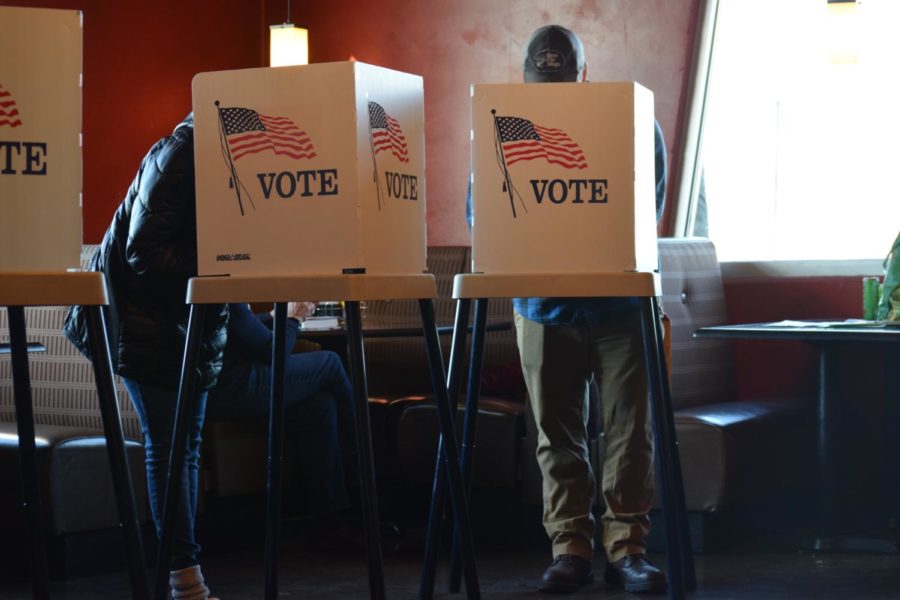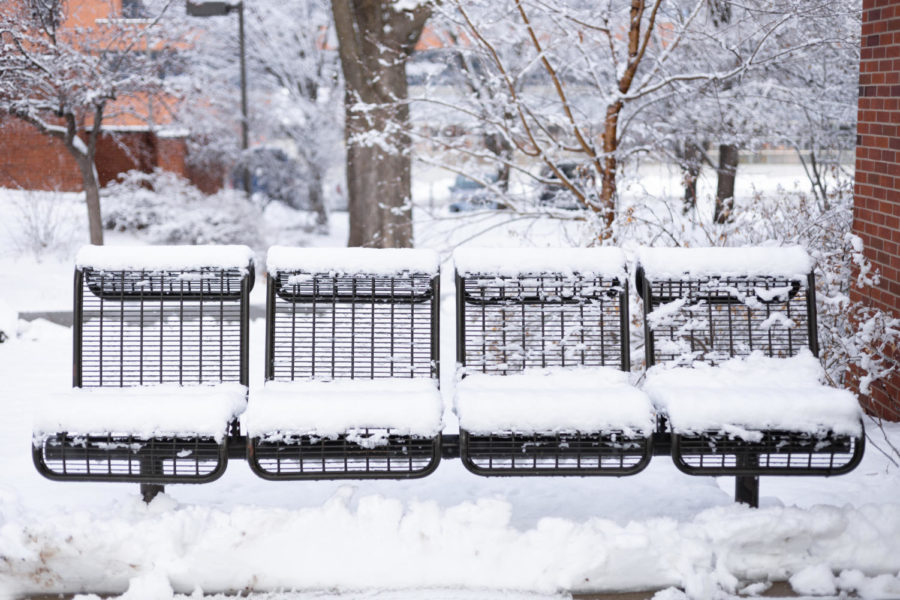Story County increases voter turnout in the 2021 city and school board election
November 7, 2021
Story County saw a higher than average voter turnout in the city and school board election, with 20.98 percent of registered voters casting a ballot.
Out of the 69,938 registered voters and 43 precincts in Story County, there were 14,673 votes.
In 2019 reported voter turnout was 12 percent, while in 2017, voter turnout was 17.63 percent in city and school board elections. In the 2020 presidential election, voter turnout for Story County was 71.11 percent.
Director of the Carrie Chapman Catt Center Karen Kedrowski said while 20.98 percent may seem low for a stand-alone local race, Story County’s voter turnout for this election cycle was outstanding.
Results for Story County came in shortly after 11 p.m. Story County Auditor Lucy Martin said while she would love for results to be in at 8:01 p.m., there is a procedure to follow to ensure counting is correct, and that takes time.
Martin said the greatest delay for her office was due to new law changes in how results must be turned in.
The Iowa state legislature also voted to shorten the window of time to mail-in absentee ballots. The in-person absentee period changed from 29 days to 20 days. The first-day county auditors may mail absentee ballots to voters is 20 days before an election instead of 29.
Absentee ballots are also no longer valid if postmarked before Election Day. They must be received by the county auditors’ office by 8 p.m. on Election Day. Martin said she doesn’t think this election is a true testimony to the impacts of the decreased time periods.
Kedrowski said the new voting legislation passed is based on the notion that American elections are not secure, and there is next to no evidence of widespread voter fraud.
“We tell the world that we know how to do democracy and that we are the role model for popular sovereignty,” Kedrowski said. “And when we systematically go through and make it more difficult for people to participate in the electoral process it makes us hypocrites and undermines our authority on the world stage.”
There were 2,046 absentee ballots cast, and regular ballots have yet to be considered but will go into that total. For general elections, Martin said absentee ballots are a much better predictor of what the turnout will look like.
This election cycle, about a third of ballots were mail-in while a third were cast at in-person satellite locations and another third at the county auditor’s office.
Martin said that in terms of preparation for Election Day, the work for her office is standard from presidential to gubernatorial to city elections. Martin said one difference is issues in local elections are more specific because they are confined to the community voting, making it difficult to determine what drives voter turnout.
“There are too many factors to point to one thing, and with the law changes there is really no apples to apples that I could do,” Martin said.
Kedrowski agreed with Martin that the true effects of the new Iowa voter laws won’t be seen until the midterms or presidential elections.
“So we got 20 percent voter turnout which is unusually high in a low voter turnout race, but that doesn’t mean the changes for voting don’t matter,” Kedrowski said. “What occurred, and I think this is especially true in Ames, was a mobilization of sophisticated voters.
Specifically pertaining to Ames, Kedrowski said the high voter turnout is an assertion to the vigorous conversation that took place in the school board election.
“What is going on with the school board in Ames is something that is really reflected nationwide,” Kedrowski said. “We are not only seeing the nationalization of local politics.”
Mask and vaccine mandates was a heavily debated topic in many school board election across the country. Ames School District implemented a Black Lives Matter Week of Action, a diversity and equity initiative to celebrate Black History Month.
Mack Shelley, chair of the political science department, said it is uncommon for school board elections to become so “partisanized.”
“There have been lots of ideologically related education issues in the past like on school busing or prayer in public school,” Shelley said. “Some of those things get handled at the U.S. Supreme Court level or congressional action. Not that those other issues were easy to solve in the first place, but the ones we are facing right now are just sort of a constellation of lifestyle and culture war kinds issues. And they are being stoked deliberately by organizations like a political action committee.”
The Ames Deserves Better political action committee (PAC) endorsed Tom Purl, Rolf Duvick and Kira Werstein for Ames School Board. Eve Lederhouse organized Ames Deserves Better with three main goals to better academic achievement, financial stewardship and social responsibility.
Lederhouse said the three candidates most aligned with the PAC’s vision, but there were no financial contributions to any of the campaigns. The PAC spent more funds than any of the individual campaigns.
Because the candidates were similarly aligned, Purl, Duvick and Werstein decided it would be effective to share campaign signs and split the cost three ways. Ames Deserves Better contributed no funds towards the shared campaign signs, Lederhouse said.
Subsets to the Ames Deserves Better goals are issues relating to returning to in-person learning during the pandemic. The PAC attributes the decline in open enrollment to the Ames School District’s unwillingness to return students to the classroom and the introduction of Black Lives Matter at School Week of Action.
Included in the Black Lives Matter at School guiding principles are affirming queer and transgender identities, along with 13 other principles.
Lederhouse said there have been assumptions about what Ames Deserves Better stands for, she said the PAC supports uplifting diversity, but they do not support the school district telling students to affirm certain beliefs or ideologies.
Another issue taken up by the school board election was bullying in schools, mainly pertaining to students of the LGBTQIA+ community. Kedrowski said while some candidates took a direct stance highlighting the importance of ensuring a safe environment for LGBTQIA+ students, others talked about the issue without recognizing the unique position LGBTQIA+ students find themselves in.
“They boiled it down to individuals without recognizing the intersectional experiences that might place them apart,” Kedrowski said.
Lederhouse said she has heard from parents who say the Ames School District has strayed away from the core standards created Iowa State Department of Education. The Ames School Board does not create a curriculum for the Ames School District but instead sets policies relating to attendance, dress code and student discipline.
“If parents want to really micromanage the materials that their students are exposed to they should home school,” Kedrowski said.
Kedrowski said curricular decisions are largely handled by experts, and then the teachers and departments agree on the activities they will implement to teach the curriculum. And curricula for Advanced Placement courses (AP) are designed nationally by PhDs and experienced high school teachers within the subject matter.
“If you don’t want your kid to read “Beloved” or be exposed to the “Federalist Papers” or take calculus or whatever it is when they don’t AP or again you home school,” Kedrowski said. “That is even largely outside the responsibilities of the school board.”
Kedrowski said she thinks the efforts to organize under Ames Deserves Better ended up mobilizing people who did not agree with the agenda of the three candidates or the PAC. In the Ankeny School Board election, Iowa Gov. Kim Reynolds endorsed Sarah Barthole, who was one of three candidates to win.
Kedrowski said she is disturbed by the state and national trend of school board candidates taking up national issues.
“We are split and divided enough along partisan lines,” Kedrowski said. “I think for the sake of our political health and the health of our democracy that we do need to have some races where we are not divided into our partisan camps. We need to have some places where people would not otherwise work together, would come together and support common unity for common causes without regard to what label they have behind their last name.”







